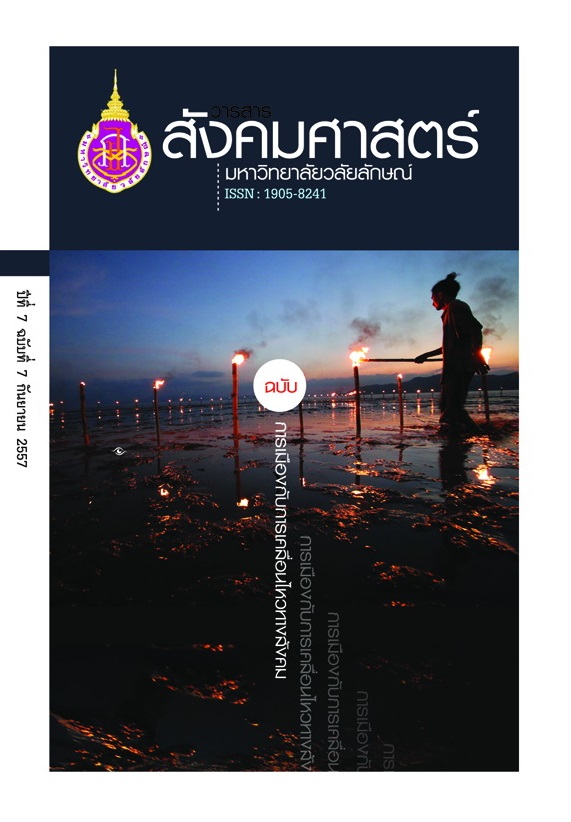Structural Infl uence of Contingency Leadership on Job Satisfaction of Village Health Volunteers in Saraburi (in Thai)
Main Article Content
Abstract
Structural Infl uence of Contingency Leadership on Job Satisfaction of Village Health Volunteers in Saraburi
In this dissertation, the researcher investigates the structural influences of contingency leadership on job satisfaction of village health volunteer in Saraburi. In regard to quantitative researcher gathered data from 350 village health volunteer in Saraburi. The instrument of research was a 5-point Likert-link scale keyed to questions pertaining to items gleaned from in Thailand and internationally published research. The items selected the variables under study. In addition, in respect to qualitative methods, the researcher conducted In-depth interview. Concerning factors influencing the job satisfaction of village health volunteer in Saraburi. Key informants were thirty the best of village health volunteer in Saraburi. Using techniques of descriptive, statistics, the researcher analyzed the data collected in terms of percentage, mean and standard deviations. Techniques of inferential statistics were used to test the hypotheses by means of applying structural equation modeling (SEM) with PLS technique.
Findings are as follows: In respect to data analysis, the researcher determined that the job satisfaction of village health volunteers exhibited a mean in an overall picture at a high level (4.29) and was overall influenced at the highest level by the factor of participation ([total effect]TE = 0.508). Next, in descending order were work empowerment (TE = 0.354) and at the lowest level was contingency leadership (TE = 0.330) The most direct influence was from participation ([direct effect] DE = 0.508) Next, in descending order was contingency leadership (DE = 0.160) and at the lowest level was work empowerment (DE = 0.105). Indirect influence was form work empowerment at the highest level ([indirect] IE = 0.249) and the indirect effect of least from contingency leadership (IE = 0.170) The factor of contingency leadership exhibited a mean in an overall picture at a high level (4.07). It exerted influence on work empowerment and participation. The factor of work empowerment exhibited a mean in an overall picture at a high level (4.15). It exerted influence on. participation.
The factor of participation a mean in an overall picture at a high level (4.21). It exerted influence on job satisfaction. For qualitative research, village health volunteers have given their opinion that contingency leadership is critical to expression by the role in each situation, because it was supported everything i.e. information, knowledge, resources It leads to a real participation which will increase job a success, happiness and job satisfaction eventually. The quantitative research findings were congruent with findings obtain on the basis of qualitative research investigation. The quantitative research findings were congruent with findings obtain on the basis of qualitative research investigation.
อิทธิพลเชิงโครงสร้างของภาวะผู้นำเชิงสถานการณ์ ที่มีผลต่อความพึงพอใจในงานของอาสาสมัคร สาธารณสุขประจำหมู่บ้านในจังหวัดสระบุรี
การวิจัยครั้งนี้มีวัตถุประสงค์เพื่อศึกษา ความสัมพันธ์ของอิทธิพลเชิงโครงสร้างของ ตัวแปรที่ส่งผลต่อความพึงพอใจในงานของอาสาสมัครสาธารณสุขประจำหมู่บ้าน (อสม.) ใน จังหวัดสระบุรี โดยใช้รูปูแบบการวิจัยเชิงปริมาณ ศึกษากลุ่มตัวอย่างอาสาสมัครสาธารณสุข ประจำหมู่บ้าน (อสม.) จำนวน 350 คน เครื่องมือที่ใช้ในการวิจัยคือแบบสอบถามเป็นมาตรา วัด Likert 5 อันดับ วิเคราะห์ข้อมูลเชิงปริมาณใช้สถิติพรรณนา ค่าร้อยละ ค่าเฉลี่ย ส่วนเบี่ยง เบนมาตรฐาน และสถิติอนุมานสำรับแบบ ทดสอบสมมติฐานด้วยตัวแบบสมการโครงสร้าง โปรแกรมสำเร็จรูป PLS Graph 2.0. และการ วิจัยเชิงคุณภาพเป็นการสัมภาษณ์เชิงลึกอาสา สมัครสาธารณสุขประจำหมู่บ้านดีเด่นระดับจังหวัดสระบุรี ตั้งแต่ปี 2554 - 2556 จำนวน 20 คน โดยวิเคราะห์ ข้อมูลเชิงเนื้อหา
ผลการวิจัยพบว่าความพึงพอใจในงานมีค่าเฉลี่ยโดยรวมอยู่ใน ระดับมาก (เท่ากับ 4.29) และได้รับอิทธิพลโดยรวมจากการมีส่วนร่วม มากที่สุด (TE = 0.508) รองลงมาคือจากการได้รับการเสริมสร้างพลัง อำนาจในงาน (TE = 0.354) และน้อยที่สุดจากภาวะผู้นำเชิงลึกสถานการณ์ (TE = 0.330) โดยได้รับอิทธิพลทางตรงมากที่สุดจากการมีส่วนร่วม (DE = 0.508) รองลงมา คือ ภาวะผู้นำเชิงลึกสถานการณ์ (DE = 0.160) และการได้รับการเสริมสร้างพลังอำนาจในงาน (DE = 0.105) และได้รับ อิทธิพลทางอ้อมมากที่สุดจากการได้รับการเสริมสร้างพลังอำนาจใน งาน (IE = 0.249) รองลงมาคือภาวะผู้นำเชิงลึกสถานการณ์ (IE = 0.170) โดยปัจจัยภาวะผู้นำเชิงสถานการณ์มีค่าเฉลี่ยโดยรวมอยู่ในระดับมาก (เท่ากับ 4.07) มีอิทธิพลต่อการได้รับการเสริมสร้างพลังอำนาจใน งานและการมีส่วนร่วม ปัจจัยด้านการได้รับการเสริมสร้างพลังอำนาจ ในงาน มีค่าเฉลี่ยโดยรวมอยู่ในระดับมาก (เท่ากับ 4.15) และมีอิทธิพล ทางตรงต่อการมีส่วนร่วม และปัจจัยการมีส่วนร่วมมีค่าเฉลี่ยโดยรวม อยู่ในระดับมาก (เท่ากับ 4.21)และมีอิทธิพลทางตรงต่อความพึงพอใจ ในงาน ในส่วนของการวิจัยเชิงคุณภาพนั้น พบว่าอาสาสมัครสาธารณสุขประจำหมู่บ้าน (อสม.) ส่วนใหญ่ให้ความเห็นว่า ภาวะผู้นำเชิงสถานการณ์ มีความสำคัญต่อการแสดงออกตามบทบาทหน้าที่ของแต่ละสถานการณ์ ซึ่งส่งผลทำให้ได้รับการสนับสนุนทั้งในด้านข้อมูลข่าวสาร ความรู้ ทรัพยากร และทำให้เกิดการมีส่วนร่วมในงานอย่างแท้จริง ซึ่งมีผลทำให้งานมีความสำเร็จและมีความพึงพอใจในงานซึ่งผลการวิจัยเชิง ปริมาณมีความสอดคล้องกับผลที่ได้จากการวิจัยเชิงคุณภาพ
Article Details
Copyright: CC BY-NC-ND 4.0


